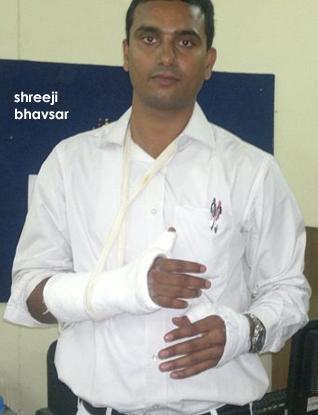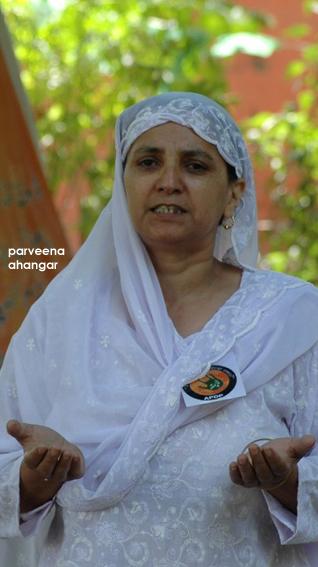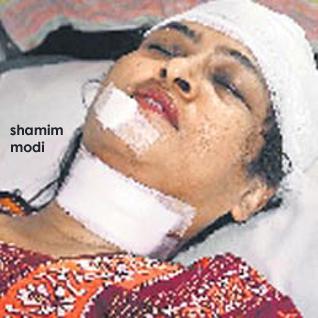Defending The Defenders Of Civilized Behaviour
by BALPREET SINGH
I had the opportunity to attend the inauguration of the Jaswant Singh Khalra Centre for Human Rights in New Delhi last month.
S. Jaswant Singh was of course the human rights activist who exposed the illegal cremation of thousands of young Sikhs in Punjab and sacrificed his life in the process.
During the inauguration, I met with human rights defenders from across India who face daily risks to their lives and liberty and have sacrificed so much. I was inspired by their courage and moved by their stories. I would like to offer my tribute to them.
As a Sikh and as someone with roots in Punjab, I am very aware of the human rights abuses that took place in Punjab and India in the 80s and 90s and the continuing excesses that are still committed by the police there. What I didn’t know was that similar abuses have happened, and continue to take place, in so-called 'disturbed' areas across India, from Kashmir to Gujarat to Chhatisgarh to the North-East.
Beyond just those targeted areas, activists who advocate for the rights of oppressed communities like the Dalits and Adivasis (original peoples) are also persecuted in shocking ways.
Below are short descriptions of a few of the amazing people who spoke at the inauguration of the Jaswant Singh Centre and whose stories need to be heard by all of us.
Advocate Shreeji Bhavsar
Part way through one of the sessions at the inauguration, a young man with a bandaged arm and leg hobbled into the room, using a field hockey stick as a cane. He slowly made his way to the stage and took a seat. When it was his turn to speak, other speakers encouraged him to remain sitting but he insisted that he would go to the podium and speak while standing. He said it would be part of his ‘protest’.
The young man’s name was Shreeji Bhavsar and he is a lawyer with the Human Rights Law Network ("HRLN"). On October 16, 2011, he along with some other activists went to the Sarita Vihar police station in Delhi to file a complaint against the illegal demolition of Dalit homes without notice. Police Officer O.P. Yadav who was present in the police station on duty, but out of uniform, told Shreeji that since it was a Sunday no complaints would be taken. Shreeji, being a lawyer, said that there was no legal basis for such a refusal. When Shreeji insisted that his complaint be lodged, the police officer began to use filthy language and beat him with a metal ruler. Shreeji managed to record the incident on his phone.
The beating resulted in Shreeji’s thumb being broken. The police found out about the recording and sent officers to raid the HRLN offices to look for Shreeji and also began to search for him by tracing his mobile.
Upon approaching the court, the Chief Justice of Delhi High Court ordered an investigation into the assault and also ordered the suspension of police officer Yadav.
Shortly after this, Shreeji was attacked while walking on the street by two assailants who beat him badly and broke his leg. It doesn’t take a detective to figure out who was behind the attack.
Shreeji had returned to his home in Rajasthan to recover but made the trip to Delhi by ambulance to attend the inauguration of the Jaswant Singh Centre.
While addressing the gathering and telling his story, Shreeji declared: “My hero is shaheed Bhagat Singh. If the canes and lathis couldn’t stop him, they won’t stop me either.”
Parveena Ahangar
Parveena is a Kashmiri human rights activist. But first and foremost, she is a mother. Parveena is the founder of the Association of Parents of Disappeared Persons ("APDP"). The APDP seeks justice and information on individuals who have been ‘disappeared’ in Jammu and Kashmir.
Parveena founded the organization after her teenage son Javaid was abducted by Indian security forces in 1990 and was never heard of again. She has since then searched for him in police stations, interrogation centers and military camps. Parveena says her fear disappeared along with her son.
Parveena spoke passionately about her struggle for justice. She told the gathering, “We don’t need money. We don’t need jobs. But we need our children. I will die but I will not give up my fight.”
I learned for the first time how young Kashmiri children are arrested and held in indefinite custody for the crime of throwing stones at Indian security forces because of their excesses. Children as young as eight and ten are held in custody as dangerous offenders and taken to their school exams in handcuffs.
Kashmir has the highest concentration of security forces anywhere in the world.
Shamim Modi
Shamim Modi, is an activist who advocates on behalf of tribals and industrial workers in Madhya Pradesh, India, and has worked to expose the nexus between politicians and the mining mafia in the state. She began her career as a pscyhologist, then became a lawyer and now is a part-time professor as well.
She told the story of how she has been the victim of a dozen false cases and even attempts on her life.
Shamim was attacked in July 2009 and had her throat slashed in her own home. She required 180 stitches and also suffered a fractured skull.
Speaking about her struggles, Shamim said that she has been falsely charged with every type of crime possible, with the exception of rape. As a result she has spent quite some time in jail. In one case, the police alleged that Shamim had kidnapped a tribal woman by the name of Phoolwati. The charges were not dropped despite the fact that Phoolwati gave a statement to the magistrate in the court that she had never been kidnapped.
Ironically in another case, Phoolwati and Shamim have been accused of being partners in a robbery (dacoity). The practice of implicating human rights activists in false cases is something that is seen across India.
In Punjab, the false case of choice is the planting of RDX explosives on individuals and claiming they are terrorists.
These are just a few of the amazing people that attended the inauguration of the Jaswant Singh Centre. The brother of Irom Sharmilla, the Manipur activist who has been on a fast for over ten years, also attended in addition to activists for Free Tibet and Nagaland. Upon hearing of the atrocities committed in Kashmir and Punjab, a Naga activist said, with tears in her eyes, that she never knew that such things happened in other places in India and she had thought her people were alone.
Another interesting revelation came from activists from Gujarat who briefly described the heinous role K.P.S. Gill - the Butcher of Punjab - played in their state after the Godhra riots. They described how Gill suggested the use of tactics he had perfected in Punjab.
Senior Police Officer Sanjiv Bhatt who has exposed Gujarat Chief Minister Narendra Modi’s role in the massacres said that he wanted to reveal all he knew about Gill’s role but because he was still a serving officer, would need to be compelled by a proper authority.
Overall, I feel very fortunate to have had the opportunity to meet so many inspiring human rights activists. The inauguration of the Centre provided an opportunity for people from across India to come together and to share their stories.
In unity there is strength.
Edited for sikhchic.com
December 12, 2011
Conversation about this article
1: Harpreet Singh (Delhi, India), December 12, 2011, 12:31 PM.
It is so painful to read such instances. A few days ago, there was an item on sikhchic.com about torture of a Canadian Sikh woman in Punjab. Why and how some people are capable of giving pain to others, is beyond me. What is the excuse for such animal behaviour? It is a fact of our history that even in the face of the highest form of provocation, Sikhs never mistreated the enemy, especially non-combatants. We need lot more of Bhai Ghannyiaas in this world.
2: Kanwarjeet Singh (Franklin Park, New Jersey, U.S.A.), December 12, 2011, 3:08 PM.
Some people do not learn the language of words and the law. Just as Bhagat Singh had to make a deaf administration hear, so is the need of this day. If most Indians are so naive as to think that plain, peaceful agitation works, then I am sorry that you are stupid and stupid people end up being fodder for the ones in power. Guru Gobind Singh was smart enough to figure out you need to have your sword do the talking if ALL peaceful means have failed. India is a failed state - we have seen time and time again - Punjab, Kashmir, Manipur, Assam, Mizoram, Delhi (1984), Gujarat (2002), Mumbai pogroms, beating and raping of women in the tribal belts, etc., etc. You still think those in power are civilized enough to hear your words and understand your agitation? We need to learn to take the 'danda' from their hands and show them how it is used. Unfortunately, most of India is weak-minded and has sheep mentality. The lions - Sikhs - used to have the guts to stand up but alas, some have now conveniently chosen to identify themselves with the sheep. Sheep get slaughtered. So time for quiet and polite agitation is over, my friends - isn't 60 years enough pain for you yet?
3: Kanwarjeet Singh (Franklin Park, New Jersey, U.S.A.), December 14, 2011, 8:22 AM.
Think one man cannot make a difference? One Tunisian fruit vendor who was constantly harrassed by cops on the beat decided to set himself ablaze in protest. This small 'insignificant' event in Tunisia set a massive fireball that engulfed Tunisia, Algeria, Morocco, Egypt, Libya, Yemen, Syria and who knows what next.





